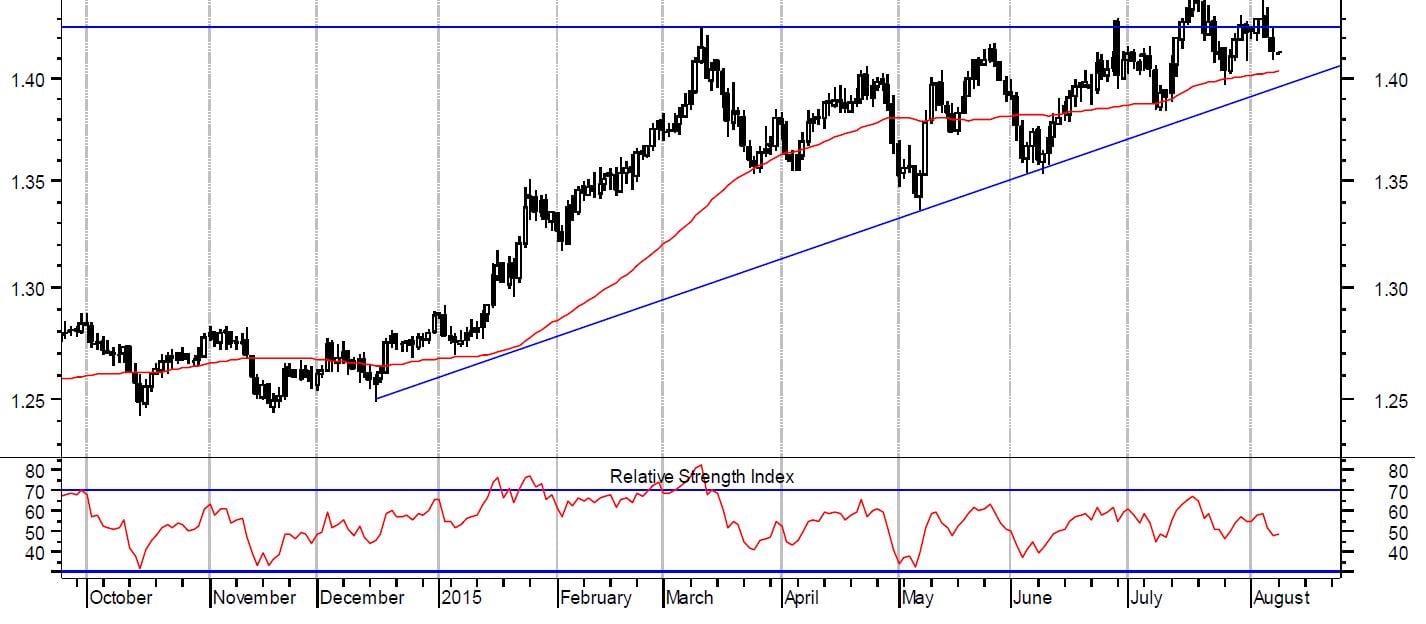GBP/EUR Exchange Rate at Risk of Further Near-Term Losses
The pound / euro exchange rate is desperately defending a key support zone, which if broken, will lead to yet further losses.

The sterling to euro exchange rate peaked at 1.44 in mid-July and then retreated back to 1.40 where renewed buying interest took the GBP/EUR back to a peak of 1.4386 in the week starting 3rd August.
Importantly this new high is lower than the previous high suggesting a change in trend as we are now witnessing 'lower highs.'
Should we be concerned that that the pound has achieved its best exchange rate of 2015 against the euro?
“We probably shouldn't be too shocked; nothing moves in a straight line for ever in these markets and the unexpectedly dovish Bank of England minutes had an immediate impact. This week is a tricky one for Sterling traders; the UK unemployment data is pretty well the only thing the Pound has to look forward to and that data is likely to produce a small backward step in job growth,” says a client briefing at brokerage Halo Financial.
If the jobless numbers disappoint and the wages growth slowed in July, (also forecast), Sterling could have another week of decline in which case we should be prepared for an extended period of weakness.
But - the Longer-Term Uptrend Remains Valid
Looking at the longer-term picture, those who can afford to wait to execute on euro money transfers should wait as there remains little to question the validity of the pound sterling’s dominance.
Bill McNamara at brokerage Charles Stanley notes:
“The UK currency traded as high as 1.4386 last week but failed to hold on to that upper level and it is starting to look like its failure to make a meaningful break above 1.44 is bringing out the short-term sellers.
“Of course, sentiment also took a hit in reaction to the aforementioned BoE interest rate decision and that pretty much accounts for the 0.49% decline over the course of the week (its second consecutive weekly retreat.”
The daily candlestick chart below shows that sterling remains above its 50-day moving average and short-term uptrend and McNamara says there is still little in the chart to suggest that these lines are about to be violated.
Be aware: The quotes given in this article refer to the interbank market, from where your bank will affix a spread when conducting international payments. However, an independent FX provider will seek to get you closer to the market, resulting in the delivery of up to 5% more FX than your bank would have provided. Learn more here.
For now we watch the support zone at 1.40 and the ability to hold this line is favoured.
That said markets could well push the GBP/EUR exchange rate down to 1.36 in the event of this zone failing. Such a move will seriously compromise our favoured bull trend scenario.
Greece Helps Pro-EUR Sentiment
Further good news comes from Greece where the government has signed a new, the third, bailout deal with creditors.
“Assuming it is approved by parliament and eurozone finance ministers, we can stop worrying about the country for a year or two — i.e. until the deal falls apart under the reluctance of the Greeks to reform and under the unrealistic assumptions built into the numbers,” notes currency analyst John Cairns at Rand Merchant Bank.
The removal of Greek-based risk is certainly one factor driving the euro higher.
Adding to the move is an improving economic outlook; however this could change should global economic sentiment fall in the wake of the Chinese growth slowdown.
Watch the Euro v Dollar
What happens in the euro v pound sterling will have a lot to do with moves in the headline euro v dollar.
The week ahead is expected to see the German ZEW sentiment continue to modestly recover from Greek related uncertainties, while the provisional estimate of Q2 eurozone GDP is expected to reveal a ninth straight quarter of expansion. Expect some residual EUR support as Greece seems to be moving towards a third bailout deal, ahead of the August 20 ECB bond repayment.
We remain mindful of the fact that the passage through the Greek Parliament in the next few sessions, ahead of a ratification by the eurogroup, will likely predicate early elections, most likely in the middle of next month.
"We have seen EUR-USD rebound from testing 1.0850 support early last week. This comes as EUR net shorts in the week ending August 8 extended to two-month highs. The extension in speculative holdings contrasts with long-end spreads, which have retreated substantially from levels seen at the end of last month," says Jeremy Stretch, currency analyst with CIBC in Canada.
Stretch reckons if we see 10-year spreads testing towards early July lows, just above 150bp, expect EUR USD to remain well supported, although for now it seems tough to suggest we can breach near-term resistance at 1.0996. Unless we close above the 1.1010/20 region we would retain a bias towards fading any EUR rallies.





